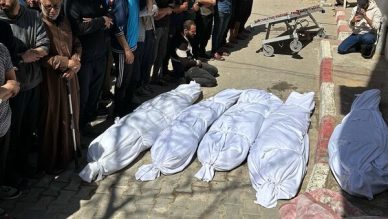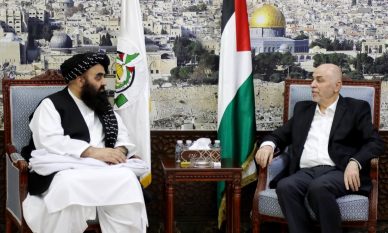GAZA, (PIC)
Among all his family members, Yazan is the only one who survived. He now lives with his grandmother and uncle in a displacement camp in the Nuseirat area in central Gaza, after surviving a massacre that killed his father, mother, and two siblings. His grandmother and uncle try to help him forget the trauma by encouraging him to play with other children among the tents, attempting to ease the burden of the painful memories that haunt him — especially when other children ask about his parents.
Grandmother Ramziya Toutah recalls the moment she received the devastating news that her daughter, son-in-law, and their two children had been killed during an Israeli airstrike while seeking shelter in the courtyard of the Baptist Hospital. “At first, we tried calling my daughter’s husband, but he didn’t answer. That’s when we knew something was wrong. Everyone had been killed. I couldn’t even identify them at the hospital — they were in pieces,” she said.
Despite her profound grief, she found a glimmer of hope. “One of my sons told me that Yazan, my grandson, was still alive. We took him and began treatment at Al-Aqsa Martyrs Hospital. But a month later, the Israeli army stormed the hospital, and we were forced to flee again — this time to Nuseirat,” she told UN News.
“I try to distract him from what happened to his family by giving him toys and sweets,” she said. “But the reality is harsh. Yazan is the only one left. I try to create a new world for him, full of laughter and play, to help him cope with all he has lost.”
Osama never met his parents
One-year-old Osama Al-Qarnawi became an orphan shortly after his birth. His mother, who gave birth to him in June, was killed in a deadly airstrike on a school in Deir Al-Balah that was sheltering displaced families. Two months earlier, his father was also killed in a separate bombing of their home in Al-Bureij refugee camp.
One of Osama’s surviving aunts found him and decided to raise him with her own children. “I promised myself I would raise Osama just like my own kids,” she told the news outlet.
Dire living conditions
On top of the emotional trauma, children in Gaza face severe living conditions due to a lack of clean water, food, and medicine. Nearly 1.9 million people — more than half of them children — are living in deplorable conditions inside displacement camps, with their suffering intensifying as the war drags on.
Children continue to suffer under the ongoing Israeli assault that began in October 2023. Millions have been repeatedly displaced, with no access to food, clean water, healthcare, or shelter. Many live in worn-out tents that provide no protection from the winter cold or summer heat. Some have even frozen to death. Thousands of children have lost their families and now live without guardians.
According to UN data, more than 17,000 children have been separated from their parents in Gaza. Hundreds of thousands have lost family members in the ongoing war.
40,000 orphans
Gaza’s Ministry of Health reported that over 40,000 children have lost one or both parents in the past year. These children not only suffer psychologically but also endure extreme hardship due to lack of basic necessities.
Dr. Munir Al-Bursh, Director General of the Health Ministry in Gaza, stated last Tuesday that Israel is committing genocide by denying water and food to Gaza’s children and depriving one million children of life-saving aid.
He further explained that over 100 children have died while waiting for border crossings to open. “More children are dying from the indirect consequences of the war than from direct Israeli attacks,” he added.
According to UN projections, between September 2024 and August 2025, 60,000 children aged 6 to 59 months are expected to suffer from acute malnutrition — with 12,000 of those being severely affected.
Orphans bearing responsibility
In addition to their trauma, many orphaned children have become the primary caregivers for their younger siblings. Experts stress that temporary solutions are not enough and have called for a dedicated fund to provide for orphans’ essential needs.
Palestinian families have stepped in to care for these deeply traumatized children. Many exhibit symptoms such as bedwetting, seizures, aggressive behavior, and extreme anxiety due to the psychological toll of losing their families and witnessing the horrors of war.
A new generation of orphans
A heartbreaking study by the Community Training and Crisis Management Center in Gaza found that 96% of children believe they are likely to die soon, while 49% expressed a desire to die.
This grim reality has made 2024 and 2025 the worst years for children in conflict zones in UNICEF’s history — both in terms of the number of children affected and the severity of the impact on their lives. In June, the UN added the Israeli army to its “list of shame” for violations against children.
The children who have survived Israel’s brutal war are now part of a new generation of Palestinian orphans. With Gaza’s only four orphanages now serving as shelters for displaced families, many orphaned children are left without formal care or are being taken in by other households.













